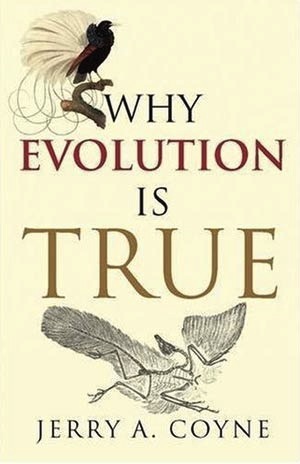 Evolution
Evolution
Underwhelmed: Reviewing Jerry Coyne’s Why Evolution Is True
 In Scotland where I live, I belong to a group that meets every few weeks in a pub in Glasgow. Called “Glasgow Skeptics,” the group attracts a range of individuals of diverse educational backgrounds. We bring in guest speakers from near and far to cover a variety of topics relating to science and critical thinking. I find myself in agreement with many of the speakers, but on a relatively small range of topics, I find myself in disagreement. An example of the latter would be the scientific validity of modern evolutionary theory and intelligent design. Readers may recall my reports on lectures by P.Z. Myers and Eugenie Scott.
In Scotland where I live, I belong to a group that meets every few weeks in a pub in Glasgow. Called “Glasgow Skeptics,” the group attracts a range of individuals of diverse educational backgrounds. We bring in guest speakers from near and far to cover a variety of topics relating to science and critical thinking. I find myself in agreement with many of the speakers, but on a relatively small range of topics, I find myself in disagreement. An example of the latter would be the scientific validity of modern evolutionary theory and intelligent design. Readers may recall my reports on lectures by P.Z. Myers and Eugenie Scott.
Last week, the Glasgow Skeptics hosted Jerry Coyne of the University of Chicago, author of the popular-level book Why Evolution Is True and a lively web journal of the same name. Since I am currently out of the country, I regrettably was not able to attend Dr. Coyne’s lecture. Spurred by the occasion, however, I thought I would offer a review of Why Evolution Is True. Though I missed seeing him in person, by the way, his usual lecture can be viewed on YouTube. The book covers his arguments in much more detail.
Chapter 1: What is Evolution?
To Coyne’s credit, the first chapter of his book carefully defines each of the key propositions of evolutionary theory. This stands in contrast to many treatments of evolution, which have a tendency to confuse readers by conflating different meanings of the word (e.g. change in allele frequencies over time; universal common ancestry; and the sufficiency of neo-Darwinian mechanisms such as mutation, selection and drift). Coyne divides “Darwinism” (his choice of word) into six components. These are: “evolution [meaning change over time], gradualism, speciation, common ancestry, natural selection and nonselective mechanisms of evolutionary change.”
No one disputes that allele frequencies in populations change over time or that different organisms have lived on the planet at different times. Furthermore, no one disagrees that natural selection (as well as nonselective mechanisms such as genetic drift) plays a role in this process. Common ancestry currently enjoys near-consensus agreement in the scientific community. My own view is that common descent is a defensible position but nowhere near as well supported as is often made out. The key points of contention, as far as I am concerned, are (1) the truth of gradualism; and (2) the sufficiency of natural selection and random mutations (in concert with other non-intelligent processes) to account for the complexity of life. On this, Coyne only spends one chapter (Chapter 5).
Tomorrow I will take a look at how he does in defending common ancestry.
